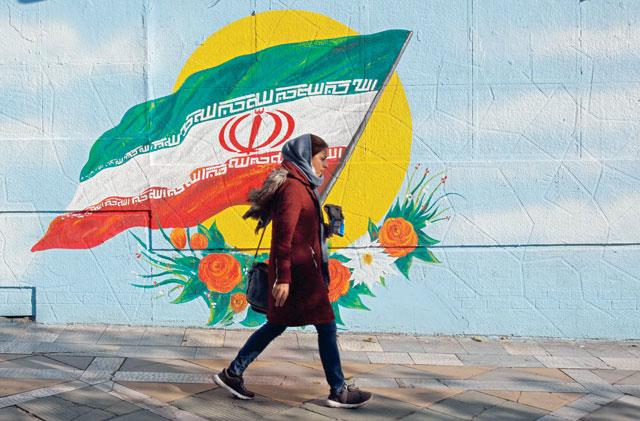You are here
Iran vows to punish 'mercenaries' behind street violence
By AFP - Nov 24,2019 - Last updated at Nov 24,2019

An Iranian woman walks past a mural painting of the Islamic republic's national flag in central Tehran on November 21 (AFP photo)
TEHRAN — Iran vowed Sunday to severely punish "mercenaries" arrested over nationwide street unrest sparked by a fuel price hike, as much of the country came back online after a week-long Internet blackout.
Authorities say calm has been restored and they have announced plans to hold a pro-government demonstration to condemn the "rioters" at Tehran's Enghelab Square on Monday afternoon.
The protests broke out on November 15, hours after a surprise announcement that petrol prices were being raised by as much as 200 per cent with immediate effect.
Highways were blocked, banks and petrol stations set ablaze and shops looted as the demonstrations turned violent and spread to dozens of urban centres across the country.
Citing law enforcement officials, Fars news agency said on Sunday that 180 ringleaders had been arrested over the street violence, which it has blamed on enemies abroad.
“We will certainly respond in accordance to the viciousness carried out by them,” said Rear-Admiral Ali Fadavi, deputy commander in chief of the Islamic Revolutionary Guard Corps.
“We have arrested all stooges and mercenaries who have explicitly made confessions that they have been mercenaries of America, of Monafeghin and others.”
Monafeghin is a term Iran uses to refer to the People’s Mujahedeen of Iran, an exiled opposition group it considers a “terrorist” cult.
The government said the fuel price hike would allow it to provide welfare payments to the needy in Iran, where many have struggled to make ends meet since the US reimposed sanctions after withdrawing from a landmark nuclear deal.
‘Coalition of evil’
Fadavi said “we have arrested all” protest leaders.
“God willing, the judiciary will give them maximum punishments,” he added.
The Guard commander was speaking at a gathering of female members of the Basij, a militia loyal to Iran’s establishment.
On Friday, a Basij commander said the unrest triggered by the fuel price hike amounted to a “world war” against Iran that had been thwarted.
Brig. Gen. Salar Abnoosh said interrogations had revealed a “coalition of evil” of Israel, the United States and Saudi Arabia was behind the “sedition”, according to ISNA news agency.
Officials have confirmed five deaths in the unrest, while Amnesty International said more than 100 demonstrators were believed to have been killed and that the real toll could be as high as 200.
The total number of people arrested over the unrest remains unclear, but the UN human rights office put it at more than 1,000 on Tuesday.
Mobile networks offline
At the height of the unrest, a near-total internet blackout was imposed in a step seen as aimed at curbing the spread of videos of the violence.
The outage had helped to “disrupt the complicated” plans by Iran’s enemies, Abnoosh said on Friday.
Connectivity was back on Sunday for much of the country except for its mobile telephone networks, said NetBlocks, a website that monitors global internet disruptions.
“In the 186th hour of #Iran’s national internet shutdown, mobile connectivity remains scarce while fixed-line/wifi is still shut in several regions,” it tweeted at 2:13pm (1043 GMT).
NetBlocks later said Internet connectivity on Irancell was back up at 98 per cent, although two other key mobile service providers — MCI and RighTel — were down at zero and one percent respectively.
Iran’s arch-enemy the United States on Friday slapped sanctions on the Islamic republic’s telecommunications minister over the outage.
It issued a call Saturday for Facebook, Instagram and Twitter to suspend the accounts of Iranian government officials until coverage is reestablished across the country.
Since May last year — when the US unilaterally pulled out of the multilateral 2015 nuclear deal, ahead of reimposing biting sanctions — the Iranian rial has plummeted and inflation has soared.
The International Monetary Fund expects the country’s economy to contract by 9.5 per cent this year.
Related Articles
TEHRAN — Iran's Revolutionary Guards Thursday praised the armed forces for taking "timely" action against "rioters" and suggested calm had b
TEHRAN — Supporters of Iran's government poured into central Tehran on Monday for a massive rally to condemn days of "rioting" that the Isla
TEHRAN — Iran's supreme leader has agreed that people killed in nationwide unrest last month who had no role in fomenting it should be treat

















